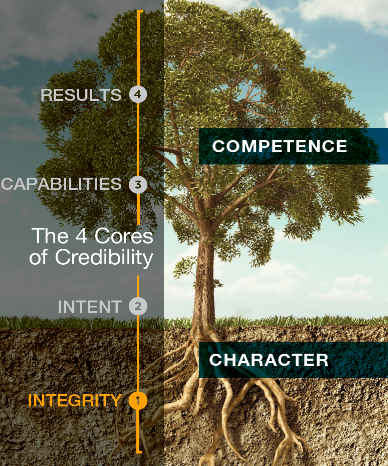The SPEED of Trust | Book Review
CFOs and auditors have replaced people developers
have replaced people and strategic-minded
HR practitioners in the throne room. (p. xxiv)
Originally published in 2006, Stephen M. R. Covey’s prescient work rings a bell. At the heart of the “Return to Office” issue is trust, or the unstated If I Don’t See You, You Probably Aren’t Working. When our start-up was acquired by ITT in 2006, the defense group had recently been cited by the U.S. government for an export violation. This was apparent upon my first visit to Fort Wayne headquarters and taking notice of the apparently limitless and growing compliance staff.
Covey offers a powerful economics of trust model (p. 13):
↓ Trust = ↓Speed ↑ Cost
↑ Trust = ↑ Speed ↓Cost
Imagine facilitating a discussion where individuals share examples of business slowing down, unnecessary “cover your ass” communication and the associated costs. When trust is high, the dividend you receive is like a performance multiplier (p. 19). Want a deeper dive? Check out the Summary of Taxes and Dividends chart on pages 22-24 -- an excellent primer for organizational self-evaluation and open discussion.
This review focuses primarily on the Covey’s first and second waves of trust: Self Trust and Relationship Trust.
Self
Accountability starts with us in the leader role. Research shows that many of us don’t follow through on the goals we set or don’t keep the promises and commitments we make to ourselves (p. 47). We’re not talking about sensational transgressions that make the front page of the Wall Street Journal. Most of the time, it’s not the huge, visible withdrawals like major ethics violations that wipe out organizational trust. It’s the little things – a day at a time a weak or dishonest act at a time – that gradually weaken and corrode credibility (p. 49). Tie in PLP somewhere credibility and trust.
Covey illustrates the four cores of credibility as a tree (p. 57)
Integrity is walking your talk. It’s being congruent, inside, and out (p. 56). In our Academy Leadership Accountability workshop, this is what we mean by It’s Starts With You. Intent has to do with our motives, our agendas, and our resulting behavior (p. 56). Recall the instinctive dimension colors within our Energize2Lead profiles gives insight into each of our motivational drivers. Capabilities are the abilities we have that inspire confidence – our talents, attitudes, skills, knowledge, and style (p. 57). These are likely the most visible of our cores developed over a lifetime of education and workplace experience. Results refer to our track record, our performance, our getting the right things done (p. 57). Or put another way, what we’re effective, rather than efficient at.
The problem in organizations, however, is that many ‘ethics”
solutions focus on compliance and not on clarifying values and
fostering integrity to those values and to enduring principles (p. 63).
Relationships
Covey outlines thirteen behaviors comprising relationship trust and form the core of the book (p. xxii):
1. Talk Straight
2. Demonstrate Respect
3. Create Transparency
4. Right Wrongs
5. Show Loyalty
6. Deliver Results
7. Get Better
8. Confront Reality
9. Clarify Expectations
10. Practice Accountability
11. Listen First
12. Keep Commitments
13. Extend Trust
Let’s showcase a couple favorite citations by Covey. Companies often have the “meetings after the meetings” or the smaller meetings where the real discussion happens, and the real issues are aired (p. 143). This was also evident at ITT Fort Wayne in 2006, especially if one wished to surface the possibility of a repeated export violation!
Covey tells the story of Tom Peek, who sent a hand written thank-you note during a competitive real estate bid. The developer said that one act clinched the choice for him, and for Tom, sending the thank-you note was a natural thing to do (p. 154). This is probably my favorite form of non-financial appreciation, especially since most people only send thank you emails. They’re not the same.
Another gem: Elon Musk is quoted “I think it’s very important to have a feedback loop, where you’re constantly thinking about what you’ve done and how you could be doing it better.” (p. 187) Our commitment to [receiving] feedback is central to our Personal Leadership Philosophy and even more important is the habit of actively seeking self-improvement.
Most of us seem to be conflict avoiders, regardless how experienced. According to a Mercer study, only 39 percent of employees believe that senior management does a good job of confronting issues before they turn into major problems (p. 195). This fear is unnecessary. In truth, people respond to accountability – particularly the performers (p. 209). This is why After Action Reviews, when done properly, are so valuable.
Here's a gem for everyone nervous about delegating: Extending trust is about shifting from ‘trust’ as a noun to ‘trust’ as a verb (p. 230). Think delegation. As in a three-day Leadership Excellence Course, Covey recommends creation of a personal Action Plan for improved relationship trust.
Summary
Covey extends the thirteen trust behaviors beyond relationships to organizations, markets and interestingly, societal trust. The Principle of Contribution is a particularly noteworthy chapter, especially for anyone launching a new company and developing an authentic and unique brand.
Trust brings out the best in people and literally
changes the dynamics of interaction. (p. 333)
JE | October 2023


